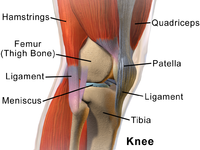
Photo from wikipedia
Age estimation, especially in pediatric patients, is regularly used in different contexts ranging from forensic over medicolegal to clinical applications. A deep neural network has been developed to automatically estimate… Click to show full abstract
Age estimation, especially in pediatric patients, is regularly used in different contexts ranging from forensic over medicolegal to clinical applications. A deep neural network has been developed to automatically estimate chronological age from knee radiographs in pediatric patients. In this retrospective study, 3816 radiographs of the knee from pediatric patients from a German population (acquired between January 2008 and December 2018) were collected to train a neural network. The network was trained to predict chronological age from the knee radiographs and was evaluated on an independent validation cohort of 423 radiographs (acquired between January 2019 and December 2020) and on an external validation cohort of 197 radiographs. The model showed a mean absolute error of 0.86 ± 0.72 years and 0.9 ± 0.71 years on the internal and external validation cohorts, respectively. Separating age classes (< 14 years from ≥ 14 years and < 18 years from ≥ 18 years) showed AUCs between 0.94 and 0.98. The chronological age of pediatric patients can be estimated with good accuracy from radiographs of the knee using a deep neural network. • Radiographs of the knee can be used for age estimations in pediatric patients using a standard deep neural network. • The network showed a mean absolute error of 0.86 ± 0.72 years in an internal validation cohort and of 0.9 ± 0.71 years in an external validation cohort. • The network can be used to separate the age classes < 14 years from ≥ 14 years with an AUC of 0.97 and < 18 years from ≥ 18 years with an AUC of 0.94.
Journal Title: European Radiology
Year Published: 2022
Link to full text (if available)
Share on Social Media: Sign Up to like & get
recommendations!